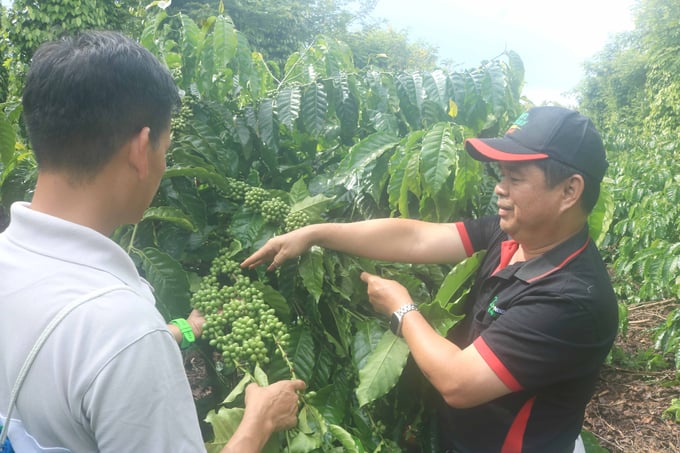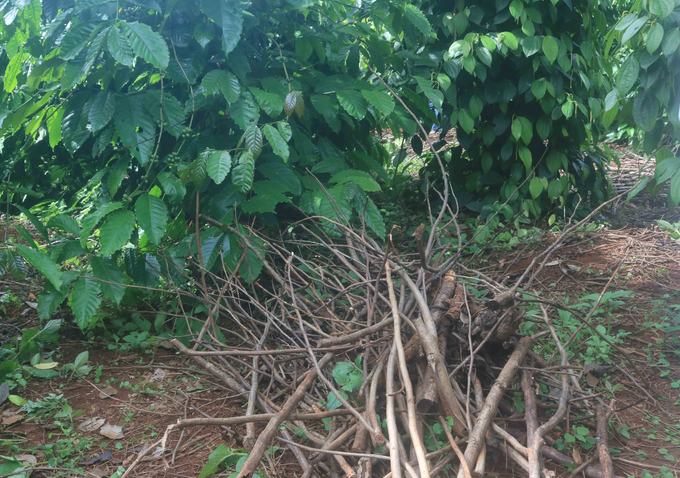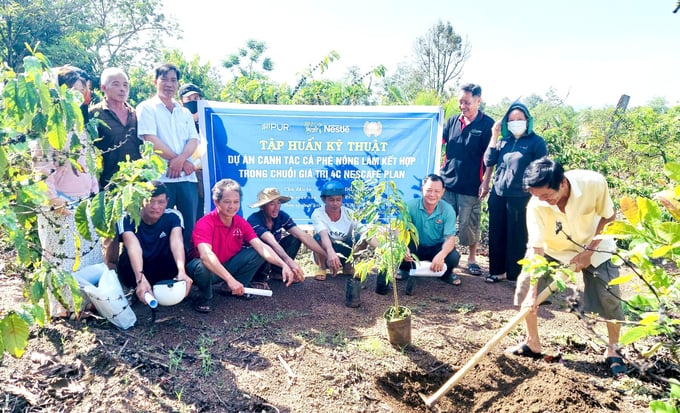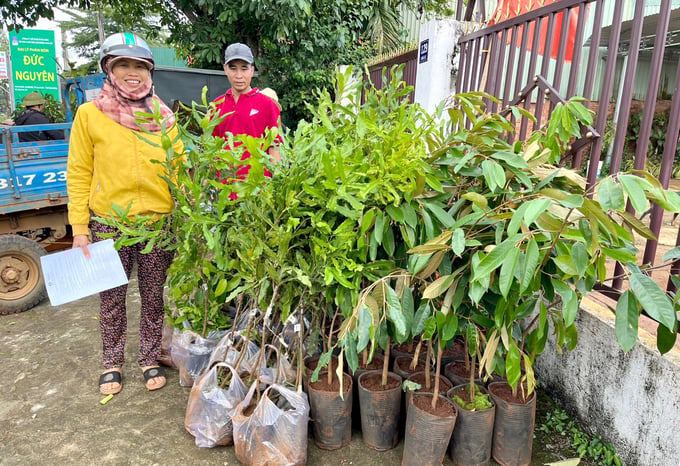May 20, 2025 | 07:56 GMT +7
May 20, 2025 | 07:56 GMT +7
Hotline: 0913.378.918
May 20, 2025 | 07:56 GMT +7
Hotline: 0913.378.918

A coffee garden applies regenerative agriculture in Ea Ktur commune, Cu Kuin district, Dak Lak. Photo: Thanh Son.
Y Hung Byă is a young farmer in Pu Hue village, Ea Ktur commune, Cu Kuin district, Dak Lak province. Previously, he worked for two years in Israel for a Thailand company. In 2015, he returned home to support his father in cultivating sustainable coffee.
Y Hung's family joined Nescafé Plan in 2014 and started replanting in 2015. Not only replanting coffee, with the guidance of agricultural staff from Nescafé Plan Vietnam but Y Hung's farm has also been entirely produced in the form of regenerative agriculture.
Specifically, the farm has applied a suitable intercropping model (between coffee and pepper), taking advantage of all the by-products from coffee farming activities such as branches, weeds after pruning, etc., as a coffee-based mulch, reducing watering by 40-60%, absolutely no use of pesticides and herbicides.
All activities on the farm have been fully recorded on a Digital Farmer Field Book (FFB) to calculate CO2 and production costs. This will help the Y Hung family decide when to sell their coffee and black pepper for the best profit and improve the income of the home garden.
Ma Khoa, leader of a group of sustainable coffee farmers in Ea Ktur commune, said that in the past, coffee-growing households in the commune mainly followed their own experiences and local farming practices with an average yield is 2 - 2.5 tons/ha. Since participating in sustainable coffee production under the Nescafé Plan, farmers have intercropped pepper in coffee gardens to create moisture and cover for coffee trees. Farmers also promote the use of micro-organisms, thereby drastically reducing chemical fertilizers (from 100% before to 45%). Regenerative agricultural methods are applied, such as using coffee waste to make microbial fertilizer and mulch for tree stumps.

Coffee branches and leaves, after pruning, are used as mulch for coffee grounds. Photo: Thanh Son.
Thanks to intercropping and regenerative agriculture, drastically reducing chemical fertilizers, farmers' production efficiency increased when the average yield reached 3 - 3.5 tons/ha. The quality of coffee also increased because of farmers. People no longer pick green coffee, but only when the fruit is 85% or more ripe. The profit on 1ha of coffee intercropped with pepper reached VND 200-250 million/ha/year, much higher than VND 60-80 million/ha/year when coffee was still grown exclusively and was not cultivated sustainably.
The program to support farmers in regenerative agriculture has been implemented by Nestlé Group for many years, not only in Vietnam but also in many other coffee-growing countries.
Binu Jacob, General Director of Nestlé Vietnam, said that currently, nearly two-thirds of the group's greenhouse gas emissions come from food materials and indirect activities of businesses. Therefore, in Nestlé's journey to achieve Net Zero emissions by 2050, reducing emissions from agricultural materials through applying a regenerative agriculture model is one of the critical things that Nestlé is pursuing in the markets.
In Vietnam, regenerative agriculture has been integrated and implemented by Nestlé within the framework of the Nescafé Plan – a sustainable development program implemented since 2011. Nestlé Vietnam shares regenerative agricultural practices with coffee farmers in the Central Highlands, mainly combining 5 solutions simultaneously: Reasonable intercropping; use of microbial organic fertilizers; saving water; biodiversity; improved soil quality.

Technical training on planting trees in coffee gardens for farmers in the Central Highlands. Photo: Thanh Son.
After 12 years of implementation, the Nescafé Plan program has supported more than 21,000 farming households in the Central Highlands to access and practice coffee production according to the 4C criteria and to conduct training on sustainable coffee farming for more than 330,000 farmers, distributing more than 63.5 million disease-resistant and high-yield seedlings, helping farmers save 40% of irrigation water, reduce fertilizer by 20%, and reduce production costs by 20% while still ensuring guaranteed crop yield. Thereby helping to improve farmers' income and contribute to reducing greenhouse gas emissions.
Recently, at Nestlé Tri An Factory (Dong Nai), leaders of the Ministry of Agriculture and Rural Development and Mr. Mark Schneider, CEO of Nestlé Group, officially launched the project "Sustainable coffee farming model according to the agroforestry model in Vietnam, aiming to plant more than 2.3 million trees by 2027.
The project is implemented in 4 provinces of the Central Highlands, Gia Lai, Lam Dong, Dak Nong, and Dak Lak, with an estimated area of over 28,000 hectares of coffee. About 30 species of trees (wood, fruit, shade, soil conservation, and windbreaks) will be planted in the coffee farms.
The purpose of planting this tree is to bring additional and stable income to farmers, contribute to soil restoration, improve ecosystems, and save water. Thereby contributing to climate change mitigation by removing carbon from trees and soil. More than 2.3 million trees planted will help absorb and store 480,101 tons of CO2.

Farmers get green trees to plant in the coffee garden. Photo: Thanh Son.
To prepare for the program of planting more than 2.3 million trees, in the past time, Central Highlands farmers have been trained in the field by experts, and seedlings have been handed over to farmers.
Pham Phu Ngoc, Head of the Agriculture Support Department of Nestlé Vietnam, shared that when seeing the benefits of intercropping green trees in coffee gardens and being supported by the project with free seedlings, farmers were very excited to join. As in Lam Dong, farmers are expected to support 23,000 trees in the first year, but farmers have registered up to 45,000 trees. The project is due in 2027, but with the ability that Nestlé Vietnam is implementing, it is possible to plant 2.3 million trees in the Central Highlands coffee gardens in just two years.
Circular economy in factories
Nestlé Vietnam has been promoting the circular economy in factories to reduce greenhouse gas emissions over the years. Design improvements to eliminate unnecessary packaging, reduce the use of virgin plastic, and replace it with environmentally friendly materials have helped Nestlé Vietnam reduce nearly 2,500 tons of plastic packaging in 2021 and 2022. About 94% of the company's product packaging is designed to be recyclable and reusable.
In production, applying the circular economy model has helped all of Nestlé Vietnam's factories achieve the goal of "No landfill waste into the environment" since 2015 through collection and classification, recycling, and reuse activities of waste.
Currently, 100% of Nestlé Vietnam's coffee grounds after production are reused as biomass materials, helping to reduce gas consumption and CO2 emissions. Non-hazardous waste sludge from production activities after treatment is also used to produce fertilizers. Waste sand from the boiler is supplied to the local unburnt brick manufacturer for construction projects.
Translated by Ha Phuc

(VAN) Vietnam aims to become a 'leader' in the region in the capacity and managing effectively soil health and crop nutrition.
![Reducing emissions from rice fields: [Part 1] Farming clean rice together](https://t.ex-cdn.com/nongnghiepmoitruong.vn/608w/files/news/2025/05/05/z6509661417740_a647202949c539012a959e841c03e1d3-nongnghiep-143611.jpg)
(VAN) Growing clean rice helps reduce environmental pollution while increasing income, allowing farmers to feel secure in production and remain committed to their fields for the long term.
/2025/05/19/5136-1-144800_230.jpg)
(VAN) The Nghe An Provincial People's Committee has just approved the list of beneficiaries eligible for revenue from the Emission Reductions Payment Agreement (ERPA) in the North Central region for the year 2025.

(VAN) 14 out of 35 domesticated elephants in Dak Lak province have had their living conditions improved, with 11 of them currently participating in the non-riding elephant tourism model.

(VAN) Muong Nhe Nature Reserve hopes that being upgraded to a national park will lay the foundation for forest protection efforts to be carried out in a systematic, modern, and sustainable manner.
/2025/05/16/3923-2-171845_52.jpg)
(VAN) Lower costs, higher yields, and improved soil quality are outstanding benefits that soybeans bring when integrated into the crop rotation system.

(VAN) The 'For a Green National Environment' programme aims to promote a green lifestyle, support businesses in implementing ESG practices, and turn Net Zero commitments into concrete actions.